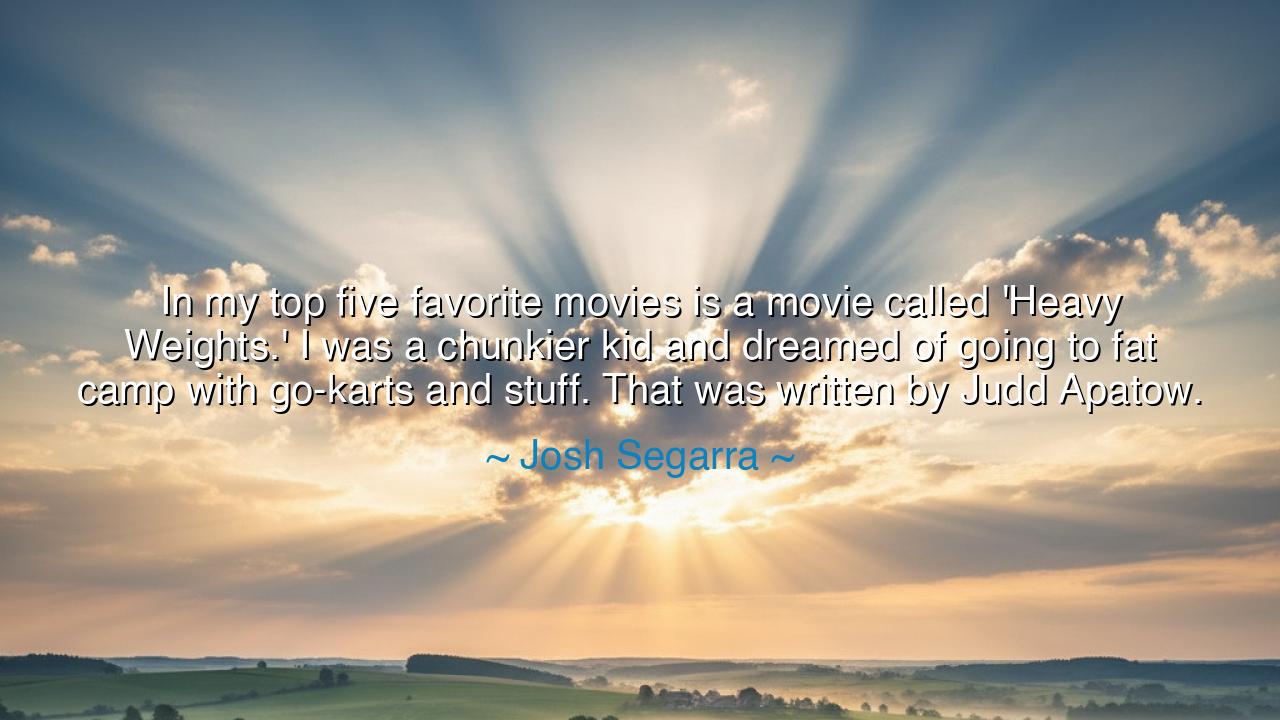
In my top five favorite movies is a movie called 'Heavy
In my top five favorite movies is a movie called 'Heavy Weights.' I was a chunkier kid and dreamed of going to fat camp with go-karts and stuff. That was written by Judd Apatow.






Hear now, O Seekers of Wisdom, the words of Josh Segarra, who reflects upon a beloved film with a sense of both nostalgia and personal meaning: "In my top five favorite movies is a movie called 'Heavy Weights.' I was a chunkier kid and dreamed of going to fat camp with go-karts and stuff. That was written by Judd Apatow." In this simple statement, Segarra reveals not only a fondness for a film but also an intimate connection to his own youth, a time when he grappled with his identity and self-image. His words speak to the universal experience of childhood and adolescence—the longing for belonging, the search for joy, and the desire to escape or change aspects of ourselves we may have struggled with.
In the ancient days, young people faced similar struggles, though the context may have differed. Consider the Greek heroes, whose journeys were often marked by their own sense of inadequacy or longing for greatness. Take, for example, Achilles, who was torn between the call to glory and his internal battles with his own fears and insecurities. While his strength was unmatched on the battlefield, he was haunted by doubts that could not be conquered by even the most heroic feats. In the same way, Segarra’s childhood experiences were not just about physical appearance, but about the emotional and psychological battles that defined his early years. His desire to escape into the world of “Heavy Weights”, with its seemingly carefree go-karts and fun camp activities, reflects that universal longing to find joy in a world that often felt difficult or unkind.
The go-karts and carefree moments of the movie, written by Judd Apatow, symbolize more than just childhood fun—they represent the innocent hope that, perhaps, by entering a different world, we might find a way to change our circumstances. The dream of going to fat camp with its laughter and adventures was, for Segarra, a reflection of the desire for transformation and acceptance. Much like the mythic stories of old, where characters would venture into new realms to discover their true selves, Segarra’s longing to be part of that world of fun and freedom reflects an inner yearning for self-acceptance and joy in the face of challenge.
Yet, O Seekers, as the ancient philosophers would remind us, the path to self-understanding is not always through escape, but through embracing and transforming the very parts of ourselves we wish to change. The hero’s journey is not one of avoidance, but one of confrontation with our flaws and vulnerabilities. Socrates taught that true wisdom comes not from hiding from the uncomfortable truths, but from embracing them with courage and humility. So, too, did Segarra eventually realize that the world of “Heavy Weights”—and the longing for a place of perfect acceptance—was not an escape from his struggles, but a reflection of the desire to overcome them in his own way. His love for the film speaks to the universality of that yearning, the need to belong and to find joy in moments of self-acceptance.
And let us not forget the influence of Judd Apatow, whose writing brought these themes to life in a way that resonates even today. Apatow’s films, known for their blend of humor and heart, often explore themes of growth, self-discovery, and acceptance—values that transcend age and time. In the same way that Apatow’s characters navigate the awkwardness of adolescence and the struggles of adulthood, Segarra’s connection to “Heavy Weights” is a reminder that we all seek a place where we can be both ourselves and accepted for who we are, flaws and all. The film’s message of embracing one’s uniqueness, despite the pressures of the world, is one that resonates with Segarra because it mirrors the deeper truth of the human condition: that transformation comes not from changing who we are, but from learning to love ourselves as we are.
Now, O Seekers, the lesson is clear: do not shy away from the struggles or the dreams of your youth, but embrace them. Movies and stories have the power to shape us, to help us understand the world and our place within it. Just as Segarra found solace and meaning in “Heavy Weights”, so too can you find guidance in the stories that resonate with you. Apatow’s story of a young boy’s longing for transformation speaks to the deeper yearning we all have for belonging and joy in the face of challenge. It is not the world we wish to escape from that defines us, but the way in which we confront it, learn from it, and ultimately transform through it.
So, O Children of the Future, take heed from the story of Josh Segarra and the world of “Heavy Weights”. The path to self-acceptance and joy is not about running away from the difficulties we face, but about embracing the struggles and finding within them the strength to change. Through stories, whether they be humorous, heroic, or tragic, we are reminded of our shared humanity, and in that understanding, we find the courage to embrace ourselves, imperfections and all. So let us, too, seek the go-karts of our own lives—the moments of joy, laughter, and acceptance that remind us that we are enough, just as we are.






AAdministratorAdministrator
Welcome, honored guests. Please leave a comment, we will respond soon